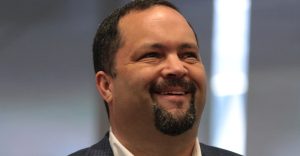Uncategorized
Alleged Malpractice by Alameda Public Defender Aided False Imprisonment of African Americans
Special to the Post
Alameda County Public Defender Brendon Woods and his predecessor, Diane Bellas, are under fire for alleged malpractice.
Complaints were filed last week with the Alameda County Board of Supervisors alleging that Woods and Bellas failed to object to the false arrest and ongoing false imprisonment of thousands of their African American clients for void Judicial Council restraining order forms.
According to the new book at Amazon.com by legal researcher Conrad Baldwin, “The Void Generation, How a Generation of Void Restraining Orders Voided the Lives of A Generation,” the documentary record proves that the members of the Judicial Council of California, including the Alameda County Public Defender, were informed on April 17, 2000 that the newly enacted Senate Bill 218, sponsored by California State Senator Solis, had voided all of California’s restraining order forms as of January 1, 2000.
All restraining orders were now required to prohibit “owning or possessing” a firearm, but the restraining order forms the Judicial Council published that day prohibited only “purchasing or receiving” a firearm.
As documented in the book by Baldwin, in response to Senate Bill 218 the Judicial Council’s legal staff “considered creating a one-page form that could be attached to the appropriate forms” to provide the required warning.
But then the Judicial Council’s staff decided that “attaching the warning to every restraining order might be burdensome to court clerks and individuals,” and they refused to provide the courts with a valid alternative form.
With no valid forms available, California’s judges were allegedly compelled to issue all their restraining orders on void forms for from two to eight years, leading to the false arrest, wrongful conviction, and false imprisonment of thousands of African American respondents.
Woods was notified by the Judicial Council on April 28, 2000 that all of California’s published restraining order forms were void, which should have freed his clients for lack of jurisdiction.
As an Associate Deputy Public Defender between 1998 and 2003, Woods claims that he “litigated jurisdiction hearings” to determine whether the courts had legal jurisdiction over his clients.
However, nothing in the documentary record indicates that Woods or Bellas ever objected to these void restraining orders on jurisdictional grounds, even as their wrongfully convicted clients were being marched off to populate California’s many prisons.
Woods assumed the office of Public Defender to “zealously protect and defend the rights of our clients through compassionate and inspired legal representation of the highest quality, in pursuit of a fair and unbiased system of justice for all.”
Now Woods refuses to comment on his alleged failure to object to these void forms. Woods also declines to discuss what the Public Defender’s office can do to free the victims of these void forms and compensate them for their monetary damages.
The Alameda County Board of Supervisors appointed Woods as the Public Defender in 2012, and he serves at the Board’s discretion.
The complaints filed against Woods request that the Board order him to explain his allegedly negligent failure to object to these void forms and how he plans to mitigate the damages these void restraining order forms caused his clients.
Whether this popularly elected Board can compel Woods to explain his plans to remedy this tragedy may determine the fate of thousands of falsely imprisoned African Americans.
Uncategorized
Oakland Housing and Community Development Department Awards $80.5 Million to Affordable Housing Developments
Special to The Post
The City of Oakland’s Housing and Community Development Department (Oakland HCD) announced its awardees for the 2024-2025 New Construction of Multifamily Affordable Housing Notice of Funding Availability (New Construction NOFA) today Five permanently affordable housing developments received awards out of 24 applications received by the Department, with award amounts ranging from $7 million to $28 million.
In a statement released on Jan. 16, Oakland’s HCD stated, “Five New Construction Multifamily Affordable Housing Development projects awarded a total of $80.5 million to develop 583 affordable rental homes throughout Oakland. Awardees will leverage the City’s investments to apply for funding from the state and private entities.”
In December, the office of Rebecca Kaplan, interim District 2 City Councilmember, worked with HCD to allocate an additional $10 Million from Measure U to the funding pool. The legislation also readopted various capital improvement projects including street paving and upgrades to public facilities.
The following Oakland affordable housing developments have been awarded in the current round:
Mandela Station Affordable
- 238 Affordable Units including 60 dedicated for Homeless/Special Needs
- Award: $15 million + previously awarded $18 million
- Developer: Mandela Station LP (Pacific West Communities, Inc. and Strategic Urban Development Alliance, LLC)
- City Council District: 3
- Address: 1451 7th St.
Liberation Park Residences
- 118 Affordable Units including 30 dedicated for Homeless/Special Needs
- Award: $28 million
- Developer: Eden Housing and Black Cultural Zone
- City Council District: 6
- Address: 7101 Foothill Blvd.
34th & San Pablo
- 59 Affordable Units including 30 dedicated for Homeless/Special Needs
- Award: $7 million
- Developer: 34SP Development LP (EBALDC)
- City Council District: 3
- Address: 3419-3431 San Pablo Ave.
The Eliza
- 96 Affordable Units including 20 dedicated for Homeless/Special Needs
- Award: $20 million
- Developer: Mercy Housing California
- City Council District: 3
- Address: 2125 Telegraph Ave.
3135 San Pablo
- 72 Affordable Units including 36 dedicated for Homeless/Special Needs
- Award: $10.5 million
- Developer: SAHA and St. Mary’s Center
- City Council District: 3
- Address: 3515 San Pablo Ave.
The source of this story is the media reltations office of District 2 City Councilmember Rebecca Kaplan.
Activism
Oakland Housing and Community Development Department Awards $80.5 Million to Affordable Housing Developments
In a statement released on Jan. 16, Oakland’s HCD stated, “Five New Construction Multifamily Affordable Housing Development projects awarded a total of $80.5 million to develop 583 affordable rental homes throughout Oakland. Awardees will leverage the City’s investments to apply for funding from the state and private entities.”

Special to The Post
The City of Oakland’s Housing and Community Development Department (Oakland HCD) announced its awardees for the 2024-2025 New Construction of Multifamily Affordable Housing Notice of Funding Availability (New Construction NOFA) today Five permanently affordable housing developments received awards out of 24 applications received by the Department, with award amounts ranging from $7 million to $28 million.
In a statement released on Jan. 16, Oakland’s HCD stated, “Five New Construction Multifamily Affordable Housing Development projects awarded a total of $80.5 million to develop 583 affordable rental homes throughout Oakland. Awardees will leverage the City’s investments to apply for funding from the state and private entities.”
In December, the office of Rebecca Kaplan, interim District 2 City Councilmember, worked with HCD to allocate an additional $10 Million from Measure U to the funding pool. The legislation also readopted various capital improvement projects including street paving and upgrades to public facilities.
The following Oakland affordable housing developments have been awarded in the current round:
Mandela Station Affordable
- 238 Affordable Units including 60 dedicated for Homeless/Special Needs
- Award: $15 million + previously awarded $18 million
- Developer: Mandela Station LP (Pacific West Communities, Inc. and Strategic Urban Development Alliance, LLC)
- City Council District: 3
- Address: 1451 7th St.
Liberation Park Residences
- 118 Affordable Units including 30 dedicated for Homeless/Special Needs
- Award: $28 million
- Developer: Eden Housing and Black Cultural Zone
- City Council District: 6
- Address: 7101 Foothill Blvd.
34th & San Pablo
- 59 Affordable Units including 30 dedicated for Homeless/Special Needs
- Award: $7 million
- Developer: 34SP Development LP (EBALDC)
- City Council District: 3
- Address: 3419-3431 San Pablo Ave.
The Eliza
- 96 Affordable Units, including 20 dedicated for Homeless/Special Needs
- Award: $20 million
- Developer: Mercy Housing California
- City Council District: 3
- Address: 2125 Telegraph Ave.
3135 San Pablo
- 72 Affordable Units including 36 dedicated for Homeless/Special Needs
- Award: $10.5 million
- Developer: SAHA and St. Mary’s Center
- City Council District: 3
- Address: 3515 San Pablo Ave.
The source of this story is media reltations office of District 2 City Councilmember Rebecca Kaplan.
Alameda County
Oakland Acquisition Company’s Acquisition of County’s Interest in Coliseum Property on the Verge of Completion
The Board of Supervisors is committed to closing the deal expeditiously, and County staff have worked tirelessly to move the deal forward on mutually agreeable terms. The parties are down to the final details and, with the cooperation of OAC and Coliseum Way Partners, LLC, the Board will take a public vote at an upcoming meeting to seal this transaction.

Special to The Post
The County of Alameda announced this week that a deal allowing the Oakland Acquisition Company, LLC, (“OAC”) to acquire the County’s 50% undivided interest in the Oakland- Alameda County Coliseum complex is in the final stages of completion.
The Board of Supervisors is committed to closing the deal expeditiously, and County staff have worked tirelessly to move the deal forward on mutually agreeable terms. The parties are down to the final details and, with the cooperation of OAC and Coliseum Way Partners, LLC, the Board will take a public vote at an upcoming meeting to seal this transaction.
Oakland has already finalized a purchase and sale agreement with OAC for its interest in the property. OAC’s acquisition of the County’s property interest will achieve two longstanding goals of the County:
- The Oakland-Alameda Coliseum complex will finally be under the control of a sole owner with capacity to make unilateral decisions regarding the property; and
- The County will be out of the sports and entertainment business, free to focus and rededicate resources to its core safety net
In an October 2024 press release from the City of Oakland, the former Oakland mayor described the sale of its 50% interest in the property as an “historic achievement” stating that the transaction will “continue to pay dividends for generations to come.”
The Board of Supervisors is pleased to facilitate single-entity ownership of this property uniquely centered in a corridor of East Oakland that has amazing potential.
“The County is committed to bringing its negotiations with OAC to a close,” said Board President David Haubert.
-

 Activism4 weeks ago
Activism4 weeks agoOakland Post: Week of November 12 – 18, 2025
-

 Activism3 weeks ago
Activism3 weeks agoIN MEMORIAM: William ‘Bill’ Patterson, 94
-

 Activism4 weeks ago
Activism4 weeks agoHow Charles R. Drew University Navigated More Than $20 Million in Fed Cuts – Still Prioritizing Students and Community Health
-

 Bay Area4 weeks ago
Bay Area4 weeks agoNo Justice in the Justice System
-

 #NNPA BlackPress3 weeks ago
#NNPA BlackPress3 weeks agoLewis Hamilton set to start LAST in Saturday Night’s Las Vegas Grand Prix
-

 #NNPA BlackPress3 weeks ago
#NNPA BlackPress3 weeks agoBeyoncé and Jay-Z make rare public appearance with Lewis Hamilton at Las Vegas Grand Prix
-

 Activism3 weeks ago
Activism3 weeks agoOakland Post: Week of November 19 – 25, 2025
-

 #NNPA BlackPress4 weeks ago
#NNPA BlackPress4 weeks agoThe Perfumed Hand of Hypocrisy: Trump Hosted Former Terror Suspect While America Condemns a Muslim Mayor










































